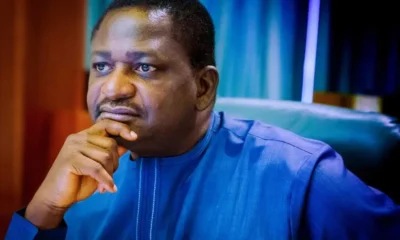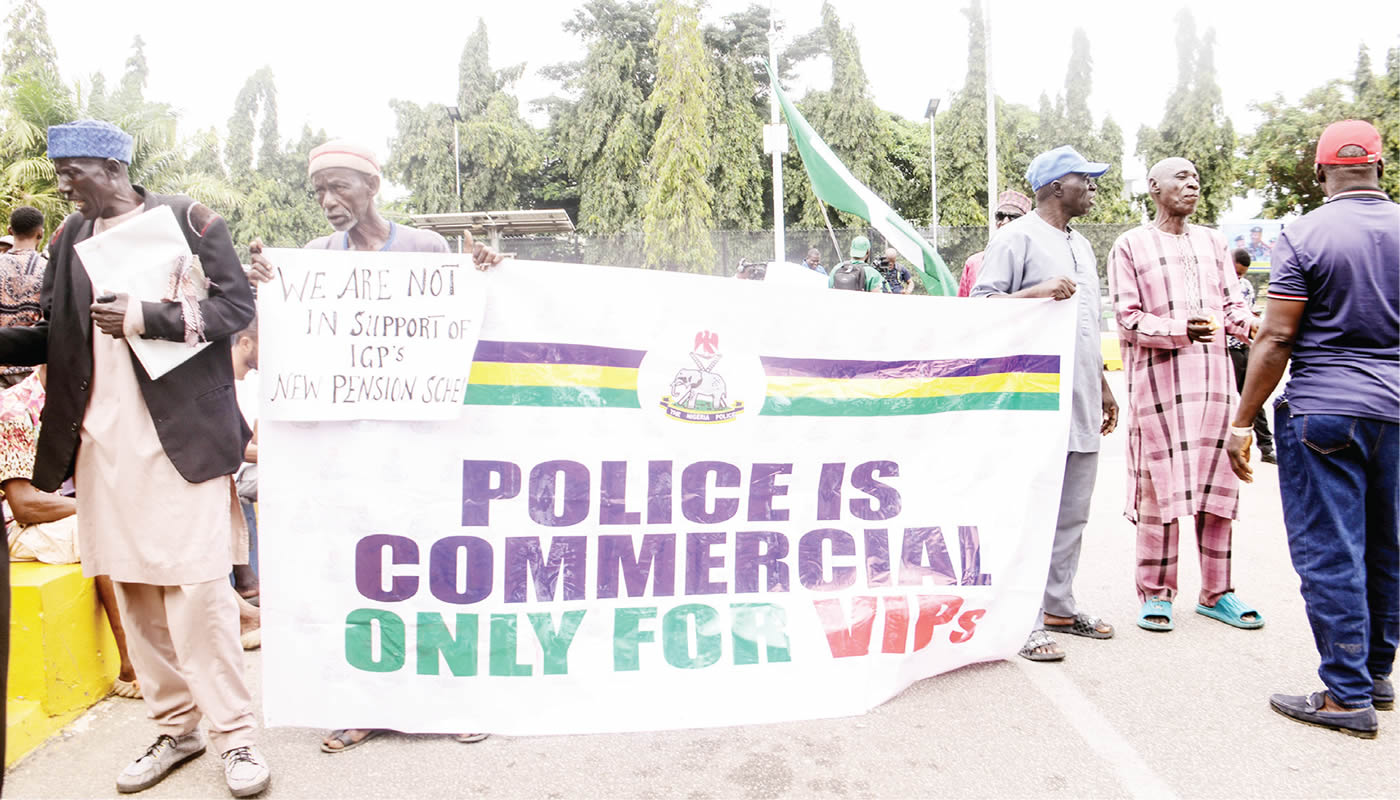Retired police personnel under the Contributory Pension Scheme took to the streets on Monday, marching from the National Assembly and blocking the main entrance of the Force Headquarters in Abuja for several hours. They demanded that the police be removed from the scheme, which they claimed had plunged them into poverty.
Despite multiple appeals to disperse, the aged ex-officers insisted on staying until they met with the Inspector General of Police, Kayode Egbetokun.
Speaking to the demonstrators, Egbetokun expressed compassion for their situation and said he did not oppose the idea of the police leaving the CPS if it would bring relief. However, he emphasized that the decision was beyond the authority of any single Inspector-General.
He mentioned that he had been discussing the welfare of retired police officers with top government officials, including the National Security Adviser, and warned the protesters not to allow themselves to be manipulated by external forces.
The protest in Abuja marked the climax of a series of coordinated demonstrations, with similar protests held by retirees in Edo and Kwara states, where the CPS was labelled “a killer scheme.”
In contrast, in Oyo State, activists from the Take-It-Back movement held a demonstration to show solidarity over poor police welfare, even though local retirees did not participate.
Leaders across the states pointed out that efforts to withdraw from the CPS began as far back as 2014, but the promised changes have yet to materialise.
In Abuja, on Monday, the retired officers assembled in large numbers and barricaded the Force Headquarters gate, disrupting entry and exit and vowing to stay until their concerns were addressed.
As tensions rose, Commissioner of Police for the Federal Capital Territory, Adewale Ajao, along with the Force Public Relations Officer, Muyiwa Adejobi, came out to urge them to leave the entrance.
The protesters stood their ground and, after several hours, finally agreed to meet with Egbetokun.
CSP Manir Lawal (retd.), who led the protest, said their campaign to leave the CPS had been ongoing since 2014.
Lawal alleged that several former Inspectors-General had failed to accurately represent the interests of retired police personnel before lawmakers.
He also expressed disappointment that commitments made during former President Muhammadu Buhari’s tenure to pull the police out of the CPS had not been honoured.
Lawal said, “Even when the National Assembly passed the bill, we heard that the then IGP wasn’t satisfied with the contents and wanted amendments. That stalled the process.”
He shared how retirees had suffered years of neglect and financial difficulty, with some even sleeping on the floor at the National Assembly to make their case heard.
He said, “I am speaking from the bottom of my heart, sir. Virtually, we have nothing at home. A retired CSP cannot even send his children to school. Our condition has deteriorated beyond repair.”
He also highlighted that some pension administrators had not paid pensions for months, pointing out that African Alliance owed some retirees over nine months of payments.
Lawal appealed to the police leadership to urgently and compassionately address their concerns.
He said, “Even our wives and children no longer respect us. We are becoming useless to society. Please forgive us if we’ve offended anyone. We are just pushing because we have been pushed to the wall.”
In Edo and Kwara states, members of the National Association of Retired Officers called on police authorities to take them out of the CPS.
During a protest in Benin, they later addressed journalists at the Nigeria Union of Journalists’ premises, accusing the scheme of being riddled with corruption.
SP Anthony Nnachor (retd.), while speaking to the press, said the CPS had been unfair to them, adding that many members had died due to the insufficient funds it provided.
He said, “We are here to let the whole world know the predicament we are passing through. We are on a peaceful mission. Everybody here with me would have served in the force for 35 years meritoriously.”
He continued, “It has become imperative for us to tell the world the problem we are going through. We are now living in abject poverty, and we can no longer meet our primary responsibility as parents.”
He added, “The majority of us are dying. What is the main reason? The police in 2004 established a Pension Act. The serving members of the scheme are supposed to contribute 7 per cent, while the federal government will contribute 8 per cent.”
He explained that retirement benefits were based on accumulated contributions, of which only 25 per cent would be given as a lump sum at retirement. He concluded by saying the Federal Government should completely remove them from the CPS.
He urged President Bola Tinubu to listen to their pleas and intervene by influencing relevant agencies opposing their withdrawal from the scheme.
Also speaking, SP Johnson Oyameda, the group’s publicity secretary, called for the scrapping of the Nigeria Police Force Pension, which he described as fraudulent.
He asked Egbetokun to assist in pushing forward the process to exit the contributory scheme.
In Ilorin, Kwara State, the Association of Retired Police Officers of Nigeria held a peaceful protest on Monday.
The demonstrators demanded to be removed from the CPS and asked for the creation of a separate police pension board to handle their pensions exclusively.
Carrying placards with various messages, the ex-police officers repeated their calls to be removed from the scheme.
Yakubu Jimoh, Chairman of ARPON’s Kwara chapter and a retired Chief Superintendent of Police, spoke at the Nigeria Union of Journalists’ Press Centre in Ilorin. He pleaded with President Tinubu to urgently address their situation.
Jimoh reiterated the call for the establishment of a police-managed pension board and complete removal from the contributory scheme.
He also urged the Federal Government and National Assembly to speed up the release of N758bn owed in pension shortfalls to security agencies. The payment was expected in June 2025 but has yet to be disbursed.
In a letter shared with the press, Jimoh stated, “Our exit being advocated should be outright removal from the scheme. Since the inception of the contributory pension scheme, it has been one problem or the other.”
He criticised officials from the National Pension Commission and Pension Fund Administrators, saying they do not report retirees’ harsh experiences to their superiors.
He said they had always opposed the contributory pension scheme, which he described as paying meagre gratuity and monthly pensions that are not enough to live on.
He added, “We are all witnesses to the lamentations of the retired police officers on social media. Imagine the Superintendent of Police being paid N2.4m as his gratuity after 35 years of meritorious service and a paltry N30,000 as monthly pension.”
Adekunle Iwalaiye, ARPON’s Legal Adviser and a retired Superintendent of Police, argued that retirees deserved a dignified pension rather than the small amount they currently receive.
Iwalaiye urged the government to respond to the retirees’ demands in light of their dedicated service to the nation over the decades.
In Ibadan, Oyo State, no retired police officers were seen at the protest organised by the Take-It-Back movement at the state police command in Eleyele.
Solomon Eniola, the group’s state coordinator, criticised the non-payment of pensions and the poor treatment of officers who had served the country faithfully.
He said, “I, therefore, called on the government to recognise the sacrifices made by police officers and ensure that their welfare is prioritised.”
IG vows action
Addressing the former officers at the Force Headquarters, Egbetokun acknowledged their plight, saying that poor pension conditions were also a concern for serving personnel.
He said, “We all feel concerned. We empathise with you because we are also going to retire. I have been engaging at the highest level to ensure that something is done to improve the condition of the poor pensioner.”
Egbetokun revealed he had just returned from a meeting with National Security Adviser Nuhu Ribadu, where they also discussed retirees’ welfare.
He said, “Even right now, I was just coming from a meeting with the NSA. The subject matter is the poor pension of retired officers. There are things that we need to do to ensure that your suffering in retirement is alleviated.”
He noted that while he couldn’t disclose all efforts publicly, significant steps had already been taken.
He said, “But I just want to assure you that we empathise with you and we are not just folding our arms. We are doing a lot to ensure that something is done.”
On the request for the police to leave the CPS, Egbetokun reiterated his support for the move.
He said, “I am not opposed to your exit from the CPS. I’m not opposed to it. If exiting from CPS will solve the problem, I will go for it. But if it is difficult for us to exit CPS, what else can we do? We have been agitating for the past 11 years, and it has not worked.”
He stressed that the decision to exit was beyond the powers of the Inspector-General alone.
He said, “The agitation to exit the CPS has been on since 2014, 11 years ago. All previous IGs tried their best to exclude the police from the CPS. But exiting the CPS is beyond the power of any inspector general of police.”
He added, “There are a lot of things that are involved. But what we’re interested in is ensuring that our retired officers live a good life after serving the country for 35 years. That is what we want.”
He explained that even within the CPS, improvements could still be made to enhance retiree welfare.
He said, “Even while in the CPS, this is what I have said that people have misconstrued. They have misinterpreted it that it is not until you exit the CPS that you can earn a good pension. Even with the CPS, we can improve the operation of that CPS and ensure that you are happy in retirement.”
He concluded by saying, “There have been several efforts in the past to exit, and it’s not working. So, as IG, I started thinking that we have to start looking for alternative ways of addressing the challenges.”
He said, “It’s these alternative ways I’m working on that people are misinterpreting as I am opposing your exit from CPS.”

 BIG STORY5 days ago
BIG STORY5 days ago
 BIG STORY4 days ago
BIG STORY4 days ago
 BIG STORY4 days ago
BIG STORY4 days ago
 BIG STORY4 days ago
BIG STORY4 days ago
 BIG STORY4 days ago
BIG STORY4 days ago
 BIG STORY4 days ago
BIG STORY4 days ago
 BIG STORY19 hours ago
BIG STORY19 hours ago
 BIG STORY21 hours ago
BIG STORY21 hours ago
























